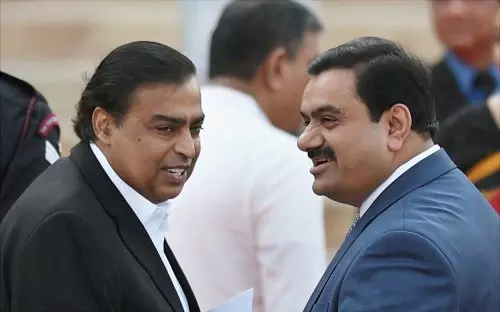
Mahan power deal: How Adani and Ambani have largely kept off each other
What changed now? In their first collaboration, RIL has picked up 26% stake in Adani Group’s power project in Madhya Pradesh

In the first collaboration between rival billionaires, Mukesh Ambani’s Reliance Industries has picked up a 26 per cent stake in Gautam Adani’s power project in Madhya Pradesh, signing a pact to use the plant’s 500 MW of electricity for captive use.
Reliance will pick up 5 crore equity shares in Mahan Energen Ltd, a wholly owned subsidiary of Adani Power Ltd, of face value ₹10 at par (₹50 crore) and will use 500 MW of generation capacity for captive use, the two firms said in separate stock exchange filings.
In its company filing, Adani Power said, “Mahan Energen Ltd (MEL), wholly owned subsidiary of Adani Power Ltd (APL), has entered into a 20-year long-term power purchase agreement (PPA) for 500 MW with Reliance Industries Ltd (RIL), under the captive user policy as defined under the Electricity Rules, 2005.”
“In order to avail the benefit of this policy, RIL has to hold a 26 per cent ownership stake in the captive unit in proportion to the total capacity of the power plant. It will accordingly invest in 5 crore equity shares of MEL, aggregating to ₹50 crore for the proportionate ownership stake,” the filing further said.
How has been the equation between the two tycoons till now?
Hailing from Gujarat, both Ambani and Adani have often been pitted against each other when it comes to business dynamics. The two have also been battling it out for the title of Asia’s richest person for several years now.
However, they rarely crossed each other’s path as Ambani's interests span oil and gas to retail and telecom while Adani's focus is on infrastructure spanning sea ports to airports, coal and mining. One of the exceptions has been the clean energy business where the two have announced multi-billion investments.
Adani has recently announced his company’s aim to be the largest renewable energy producer in the world by 2030, while Ambani's Reliance is building four giga factories at Jamnagar in Gujarat -- one each for solar panels, batteries, green hydrogen, and fuel cells. The Adanis are also building three giga factories for manufacturing solar modules, wind turbines and hydrogen electrolysers.
The businessmen were also expected to clash during the auction of the 5G spectrum airwaves, but unlike Ambani, Adani ended up 400 MHz spectrum in the 26 GHz band, which is not for public networks.
How have Ambani and Adani have managed to keep off each other till now?
At a casual glance, these conglomerates can be on a collision course, competing fiercely for market supremacy in one of the world’s fastest-growing economies. However, despite having sizable and somewhat overlapping business interests, Ambani and Adani remarkably maintain a harmonious coexistence in India’s fiercely competitive corporate landscape.
The captive power deal involving MEL is the first direct transaction between the two large conglomerates. The only association they have ever had – fleeting and indirect – was in 2022 when the Adanis were trying to gain control of NDTV.
In August 2022, an Adani group firm had acquired a little over 29 per cent in NDTV which was then controlled by Radhika and Prannoy Roy. It came after Vishvapradhan Commercial which held warrants of RRPR Holdings, a NDTV promoter entity, was sold to AMG Media Networks, an Adani Enterprises arm.
Vishvapradhan Commercial had extended a loan of Rs 400 crore to the promoters of NDTV in 2009-10. It was initially controlled by Reliance Industries and was later acquired by the Nahata group and subsequently by Surendra Lunia of the Infotel group.
Adani recently attended the pre-wedding bash of Ambani’s youngest son, Anant, at Jamnagar earlier this month.
On the topic of rivalry, Adani said that Ambani is a very good friend of his, and that his late father, Dhirubhai Ambani is his role model. “Dhirubhai is a role model. The way he set up and scaled Reliance Industries even before liberalisation, he showed the way forward. He is an inspiration,” Adani said once in an interview.
He also praised Mukesh Ambani, saying he took the Reliance group forward and expanded it. “Mukesh bhai is a very good friend. I respect him a lot. He gave Reliance Industries a new direction with Jio, technology and retail, apart from his primary petrochemical business. He has made a big contribution towards developing the country,” he said
Analysts tend to group Ambani and Adani together as a kind of India Inc. duopoly. “By backing the ‘2As’ at the expense of other companies, both domestic and foreign, the government is encouraging an extraordinary concentration of economic power,” economist Arvind Subramanian, an adviser to the Modi administration until 2018, and Josh Felman, a former International Monetary Fund official in New Delhi, wrote in a foreign affairs article about how India’s inward turn could stymie its rise.

